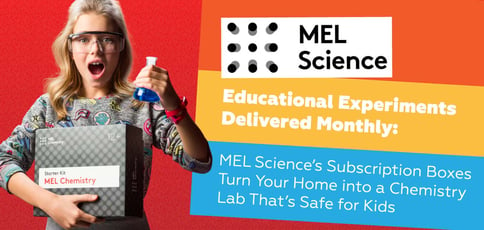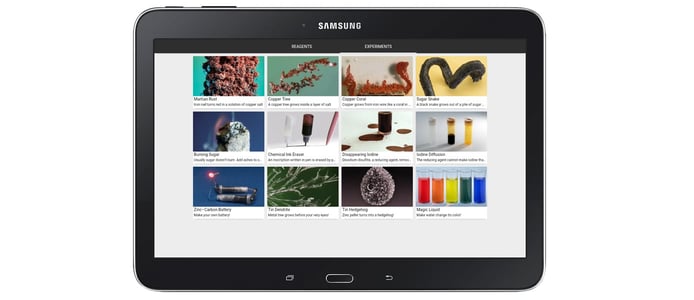
TL; DR: MEL Science, a monthly subscription box company, is on a mission to make science education easy, interesting, and effective. The company’s safe and engaging chemistry experiments and virtual reality lessons provide ample learning and instructional opportunities for parents, kids, and educators alike. With plans in the works for the introduction of new kits focused on biology and physics, plus a Wikipedia-like database of experiments, MEL Science is committed to taking early science education to the next level.
If you haven’t seen the recent viral video exposing the secret of the aluminum can, you’re missing out. Spoiler alert: Hidden inside is the one thing even Drano can’t beat — plastic. In the video, which has now amassed more than 75 million viewers, MEL Science demonstrates how you can use sandpaper, a beaker, drain cleaner, and a wooden rod to reveal the hidden layer inside our everyday drinking vessels.
The video is part of MEL Science’s greater efforts to expand public interest in science through safe and exciting science experiments for children and adults. The company’s subscription boxes, delivered monthly to your doorstep, combine theory with a hands-on approach to learning.

MEL Science brings chemistry experiments and virtual reality lessons to your doorstep.
“A subscription box is a great learning model because you receive a constant inflow of new experiments that help you discover something new about the world around you,” said Fedel Katro, Director of Marketing at MEL Science. “When you buy a traditional chemistry set, it’s expensive, you perform a couple of experiments, and it ends up somewhere under your desk.”
Each subscription to a MEL Chemistry set includes a starter kit and a monthly delivery containing the equipment you need to conduct two to three experiments. Children as young as six can enjoy the experiments with careful parental supervision, but MEL Science is designed specifically for children and young adults ages eight to 12.
All experiments are backed by in-app support, and users receive a free cardboard headset that turns a smartphone into a portal to virtual reality lessons. With plans for future sets exploring fields of science, such as biology and physics, and a new, comprehensive knowledge base of experiments, MEL Science is continuing to make science education fun and accessible for both children and adults.
Safe and Educational Experiments with Mobile App Support
MEL Science was launched in 2015 by Vassili Philippov, a Russian developer and physicist who lives in London. At the time, Vassili, who has earned numerous physics Olympiads, was raising four children and wanted to provide them more than standardized education could offer.
“He decided to devote himself to education because he believed that early science education was not well developed,” Fedel said. “In order to learn something, you have to be able to get your hands on it.”
That’s why, from the start, Vassili bundled his mobile application, which provided interactive step-by-step assistance and 3D models of molecules, with physical lab equipment to help children gain a comprehensive understanding of each experiment.
By 2016, the London-based company made its first sales in the U.S. and U.K. The next year, it launched its set of chemistry and virtual reality lessons. And by 2018, MEL Science was shipping its products to users in more than 35 countries.
Today, the company continues to grow its consumer base as well as its social media following. In addition to the now-infamous aluminum can video, Fedel said MEL Science has produced more than 300 videos of chemistry experiments designed to expand public interest in science.
When it comes to attracting eyeballs, the effort appears to be a success. “We have more than 1 million followers on our social networks, including 260,000 on Instagram and almost 800,000 on Facebook,” he said. “The good thing is that people are starting to pay more attention to science, and that is what we’re trying to achieve with our content.”
A Fun Learning Opportunity for Parents, Kids, and Educators
In addition to parents who use the kits to spend time with their children outside of school, MEL Science has enjoyed success among the homeschooling community. The monthly subscription box provides a safe and educational replacement for in-school projects, allowing homeschool educators to bring the laboratory home.
“MEL Chemistry kits are a great alternative to a school lab because we ship all the instructions and ingredients necessary to facilitate the experiments, and they’re absolutely safe,” Fedel said. “They meet all of the U.S. and European safety requirements — and the European standards are much more strict.”

The company features a wide-ranging experiment list available through an intuitive mobile app.
Since 2017, MEL Science has also sold kits to charter schools. The company is now a registered vendor in approximately 350 schools across the U.S., enabling homeschooling families in regulated states, such as California, to purchase the product for educational purposes.
The kits also serve as an engaging complement to after-school classes and science clubs, and the company’s virtual reality-based chemistry lessons are precisely aligned with the K-12 curriculum. While the MEL Chemistry subscription box is currently intended for parents with children in the late elementary and early middle school stage, Fedel said the company is working on kits geared toward younger children ages 4 to 8.
Free Access to Virtual Reality Lessons for Subscribers
MEL Science’s VR chemistry program is extremely comprehensive, with 28 lessons and tests covering all main topics within the grade school chemistry curriculum. Virtual reality makes for a visual and interactive learning experience encapsulated into short, easy-to-digest videos.
The first lesson, Atoms in Solids, takes the viewer inside a diamond and a piece of graphite at the atomic level to illustrate how their structures differ although they are built out of the same carbon atoms. And all of this is accomplished in just over three minutes. There are a whopping 80 lessons in total, with topics ranging from molar mass to radioactive isotopes.
MEL Science chose to use virtual reality as a tool for introducing children to the world of molecules because it provides a more profound understanding than memorization of formulas and facts.
Fedel said all subscribers receive access to these lessons at no charge. Educators who have virtual reality technology in their classrooms and are interested in using the content as part of their lesson plans can purchase a license and download the app on their corresponding devices.
MEL Chemistry offers five sessions of MEL VR for free, and those without a virtual reality-enabled classroom may choose to work with MEL Science’s partners, RedboxVR and Virtual Reality Experience. Fedel said virtual reality provides a welcoming learning environment for today’s tech-savvy youth.
“It’s really challenging to get kids off of their devices, and that’s why we have the mobile app and the VR lessons,” he said. “We have to play in their field.”
New: A Wikipedia-Like Database for Science Experiments
MEL Science has big plans for the future, including the introduction of brand new kits similar to MEL Chemistry but focused on biology and physics, and kits for younger children.
In addition, the company is developing a comprehensive knowledge base for science experiments that Fedel said will be similar in format to Wikipedia.
“It will be an easy-to-browse resource you can use to find and filter experiments by categories such as difficulty and setting (like a laboratory, home, or classroom),” he said. “It will be a really handy website for science teachers to easily find inspiration.”
The effort correlates with MEL Science’s overall strategy, which is designed to increase interest in science through various online content.
HostingAdvice.com is a free online resource that offers valuable content and comparison services to users. To keep this resource 100% free, we receive compensation from many of the offers listed on the site. Along with key review factors, this compensation may impact how and where products appear across the site (including, for example, the order in which they appear). HostingAdvice.com does not include the entire universe of available offers. Editorial opinions expressed on the site are strictly our own and are not provided, endorsed, or approved by advertisers.
Our site is committed to publishing independent, accurate content guided by strict editorial guidelines. Before articles and reviews are published on our site, they undergo a thorough review process performed by a team of independent editors and subject-matter experts to ensure the content’s accuracy, timeliness, and impartiality. Our editorial team is separate and independent of our site’s advertisers, and the opinions they express on our site are their own. To read more about our team members and their editorial backgrounds, please visit our site’s About page.

